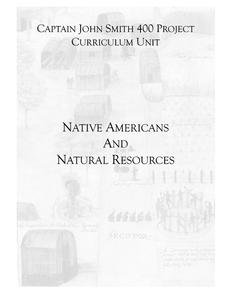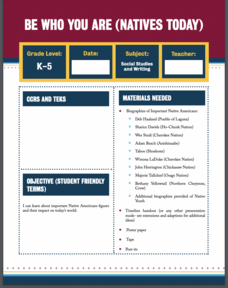Core Knowledge Foundation
Native Americans—Regions and Cultures Tell It Again!™ Read-Aloud Anthology
Native Americans are the focus of a read-aloud anthology. Over two weeks, third graders listen to and discuss informational texts detailing the life and culture of various regions. Pupils complete extension activities and show what they...
Curated OER
Changemakers Lesson Plans
Teens and tweens are invited to become changemakers in a five-lesson unit, asking them to investigate and share what they have learned about exemplary, contemporary Native Americans. They gather facts about their research subject, record...
K20 LEARN
Word Warriors: The Code Talkers of Oklahoma
The battle between code makers and code breakers has been going on for centuries and is a key tool of warfare. The contributions of the Native American Code Talkers of World Wars I and II are celebrated in a lesson that features a...
Anti-Defamation League
Impact of the U.S. Expansion on Indigenous People and Stereotypes About Native American People
The 2004 U.S. bicentennial sparks a discussion about its meaning and importance to United States history. Readings, maps, tables, and reflective writing prompt small groups to explore the westward expansion, Lewis and Clark, and how...
Core Knowledge Foundation
Native Americans Tell It Again!™ Read-Aloud Anthology
A 154-page anthology explores the life, culture, and history of Native Americans. Eight lessons follow the routine of introducing the reading, conducting the reading, discussing it, doing word work, then taking part in an extension...
iCivics
Tribal Government: High School
Did you know there are 567 federally recognized American Indian and Native Alaskan tribes and villages in the United States alone? The resource helps break down the complexities of many different tribal societies to explain the concept...
Curated OER
Native Americans of the Chesapeake Bay: Using Primary vs. Secondary Sources
Discover the rich Native American culture that existed at the time of early European exploration into the Chesapeake region through analysis of several primary and secondary sources.
Curated OER
Native Americans and Natural Resources
North American Indian civilizations had already been in place for over 10,000 years before the arrival of European settlers. Introduce your young historians to Indian tribes that lived in the Chesapeake region in the...
National Museum of the American Indian
Lone Dog's Winter Count: Keeping History Alive
What is oral tradition, and what unique tool did the Native Americans of the Northern Great Plains use to help them remember their complex histories? Through pictograph analysis, discussion, research, and an engaging hands-on activity,...
Core Knowledge Foundation
Maya, Aztec, and Inca Civilizations
Here are a series of lessons on the Mayan, Aztec, and Incan civilizations. This incredible, 15-lesson unit would be perfect for any fifth grade study on these important civilizations. Learners focus on the complex nature of the cultures,...
Curated OER
Navajo Sand Paintings
Research the use of sand paintings in the Navajo tribe. Your students work together to design their own sand painting. They share their creation with the class describing what the symbols mean.
Curated OER
Trail of Tears
A fabulous PowerPoint resource that thoroughly and accurately desicribes the Cherokee culture from the 1500's through the mid-1800's when they were forced to leave their homeland and march to Oklahoma in the famous, "Trail of Tears."...
Curated OER
The Cultural Significance of Naming
The Navajo would disagree with Shakespeare that the naming of things is irrelevant. Navajo people have to earn their names. Middle schoolers learn about the cultural significance of Navajo names in a lesson that uses a video and reading...
Curated OER
Te Ata Fisher: The Award-Winning Chickasaw Storyteller
Storytelling is a time-honored way to keep a culture alive. Introduce middle schoolers to Te Ata Fisher, the famous Chickasaw storyteller who shared her stories, songs, and dances across the United States and Europe. Young historians...
Curated OER
What Exactly Is Food Sovereignty?
Something is happening here, and what it is is becoming increasingly clear. Middle schoolers investigate the connections between processed foods and health issues and the movement back, especially by Native Americans, to other food...
Curated OER
Celebrate Joy Harjo: The First Native American Poet Laureate
Introduce middle schoolers to Poet Laureate Joy Harjo with a lesson that not only explains the role and duties of the Poet Laureate but also contains a video in which Harjo explains what she sees as her responsibility as a Native...
Curated OER
Food Traditions: Making Cherokee Bean Bread
Imagine being forced out of your home and walking over 1,000 miles with only the things you could carry. How would you survive? What would you eat? After reading about the Trail of Tears and Cherokee resilience, middle schoolers are...
Smithsonian Institution
Harvest Ceremony: Beyond the Thanksgiving Myth
There is a grain of truth in myths. Young historians investigate the truths surrounding the popular beliefs about the First Thanksgiving in Plymouth, Massachusetts. After reading the information in a study guide, they use what they...
K20 LEARN
Worcester v. Georgia: Cherokee Sovereignty and Actions of the U.S. Government
Young historians study the Supreme Court case "Worcester v. Georgia" and note instances where the Justices defended the sovereign rights of the Cherokee. They also examine the actions of President Andrew Jackson and the...
Curated OER
Be Who Your Are
An engaging video begins a lesson plan all about the representation of Native Americans in all types of careers. Following a discussion about the video, scholars participate in a gallery walk showcasing various Native American figures....
K20 LEARN
Reconstruction Treaties Of 1866: The Reconstruction In Indian Territory
The Reconstruction Treaties of 1866 and their impact on the Five Tribes in the United States Civil War are the focus of a lesson that asks young historians to consider how these treaties affected tribal sovereignty. Class members do a...
Curated OER
Indigenous Peoples’ Day Lesson Plan
Indigenous Land Guardianship, Settler Colonialism, Racial Capitalism. While the terms may be new to some, they feature in a lesson plan designed for Indigenous Peoples' Day. Young scholars investigate four concepts: Land...
Curated OER
Giving Thanks: A Haudenosaunee Message of Thanksgiving
A discussion of thankfulness opens a lesson followed by a read-aloud of the "Haudenosaunee Thanksgiving Address Greetings to the Natural World." Scholars answer questions and write down what they are thankful for in their home or...
K20 LEARN
Transcending Boundaries - The Kiowa Six: The Legacy and Contributions of Six Kiowa Artists
The Kiowa Six, a group of Kiowa artists, are featured in the lesson that asks young historians to consider the importance of art in representing a culture and contributing to a group's legacy. After examining paintings by the group and...

























